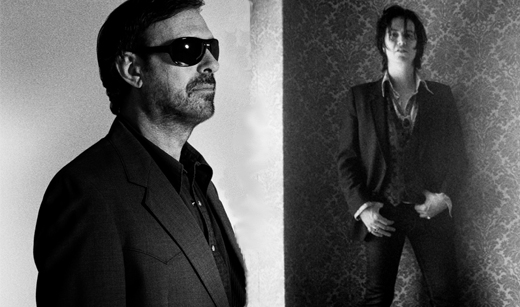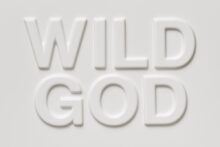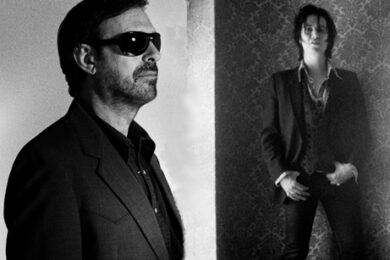We put well-dressed gentlemen of rock Mr Jim Sclavunos of Grinderman and The Bad Seeds and Mr Jim Jones in a room together and asked them to discuss the molten power of rock & roll and other matters of import & significance. Jim Scalvunos produced the latest Jim Jones Revue album, Burning Your House Down, which was released in September. Here is the result of this meeting of minds:
Jim Sclavunos: It’s usually taken for granted that electric guitar is the central pre-eminent instrument that gave birth to rock n’ roll, yet piano was there from the outset rocking away. Do you feel piano and the great rock and roll piano players haven’t gotten due credit or glory over the years? Who are the great rock n roll piano players (past and present)? And as pian is an important part of the Jim Jones Revue sound, do you see yourselves somewhat redressing a guitar-centric bias?
Jim Jones: Absolutely! A lot of the the best rock & roll guitar riffs were originally piano riffs, and for me it wasn’t until DJ Fontana and pianists like Shorty Long and Floyd Cramer were added to Elvis’ band that he became a rock & roll artist as opposed to a blues or rockabilly singer.
In terms of the piano greats of rock & roll, Louisiana, (in particular New Orleans) is pivotal. Fats Domino, Smiley Lewis, Huey Piano Smith, Jerry Lee Lewis from Ferriday, were all based there. Follow the Mississippi up to Jackson where Otis Spann got started before settling in Chicago. Johnnie Johnson also ended up in Chicago from West Virginia. All great. Little Richard of course, who in my opinion really defined rock & roll, not so much as just a piano player but more the whole package. Everything about him in those early J&M sessions is pure blood and guts. Richard started out in Macon, Georgia but really made his mark in New Orleans. Esquerita is worth a mention, but more as a style icon than a piano great. Of course there are other piano greats down though the years, but not strictly speaking Rock and Roll.
JS: The music of The Jim Jones Revue hearkens to an older style of rock music yet doesn’t sound like a retro retread. How does The Jim Jones Revue manage to sound both authentic and new? What do you think keeps music vital and real? How would you respond to anyone who would dismiss The Jim Jones Revue’s music as ‘old-fashioned’ or ‘out-dated’?
JJ: Good question. I would say that it’s important to avoid the fashion, nostalgia, or trend elements that surround the music. Go for the spirit of the thing… dig out the pearl and put it in your own setting. Anyone who’s prepared to dismiss something for the sake of fashion has missed the point (in life as well as in music). It’s the heart and soul of the thing that counts …the way it moves you. If it happens to be stylish too, then that’s just a nice bonus!
JS: What aspect of the music business or which artist to you embodies the best of what’s happening today? Who or what embodies the worst aspect of 21st century music to date?
JJ: Without getting into too much depth…
Tom Waits = Good
Simon Cowell = Bad
JS: What do you think is the ultimate compromise a band would have to make? Have you ever been or can you imagine being faced with such a prospect?
JJ: There are always small compromises to deal with… ‘turn down’, ‘not like that, like this’, ‘hurry up and wait’, etc. There’s a certain amount of shit one has to eat just to keep rolling. I think if these small compromises were increased to a point where your will was being continuously eroded, chipped away at, you could kill a band like that, under the radar. I can’t imagine any kind of ultimate compromise. Surely you would just say NO? Unless you were tricked into it? A Faustian contract of some kind maybe. It’s a vile image. I’m sure someone like Simon Cowell would be involved.
JS: Do you have a favorite guitar? Any special guitar tricks, techniques or advice you care to impart?
JJ: The best guitar is the one you feel most comfortable with, the one you can communicate with. Not necessarily the one that’s easiest to play – there’s a lot to be said for the struggle, it can give more soul to the music. Also the right hand (the strumming hand) is way more important than the left. Rhythm outranks melody 9 times out of 10!
Messrs Sclavunos and Jones then swapped places for the next portion of the interview
JJ: Can you remember the first time you really knew you wanted to play drums and talk about some of the key artists that inspired or influenced you as a drummer?
JS: I am forced to acknowledge the jaw-dropping momentousness of seeing The Beatles for the first time on The Ed Sullivan Show. Ringo looked like he was having a great time, playing with effortless fury while radiating amiable cockiness. I didn’t quite understand what I was hearing but I knew I really liked it!
A friend of mine had a drum kit that his parents bought him. Sometimes when I’d visit he’d let me bang around a bit and his 45 of “Yellow Submarine” was the first tune I attempted to drum and sing along with. By the time of the regrettable “Octopus’ Garden”, I had already moved on, my mind blown by Keith Moon, Ginger Baker and Mitch Mitchell, with the mighty John Bonham was right around the bend. That whole generation of British drummers enthralled me long before I ever really played or had my own kit. I didn’t actually begin playing drums until my twenties.
JJ: How did you end up being a Bad Seed?
JS: I first met Nick Cave and Mick Harvey on The Birthday Party’s last tour of America. I was playing sax for Lydia Lunch on the same bill. I didn’t run into them again until years later when I was stranded penniless in Vienna, basically living from gig to gig. Months after that random encounter, I was back in Brooklyn with my tail between legs, having finally run out of options and gigs. Mick Harvey phoned me out of the blue asking if I fancied three months of touring Let Love In with The Bad Seeds, playing percussion and organ. I thought for sure it was going to be just another temporary gig, but here I am, 16 years later, still hanging in there…
JJ: It still seems unreal to me that he’s dead. Can you tell us some of your fondest memories of working with Lux Interior?
JS: The Cramps had a good work ethic: lots of long rehearsals in the basement of their house and we recorded every single one. Lux would run his vocals through an Echoplex, messing around with it almost constantly, leading to some pretty ridiculous results at times. I hope those tapes someday come to light; they’re way more raw and crazy than the album we were so assiduously practicing in preparation for (Look Mom, No Head).
Not many people know that Lux was also an avid shutterbug with a particular enthusiasm for stereo (3D) photography. At the time I was in The Cramps he had already collected 2 or 3 vintage stereo cameras, including a robust Russian model that he was quite proud of. He took a whole series of vivid, gorgeously saturated portraits of me that very sadly got stolen. Lux somehow had that sort of ‘50s camera buff mentality, exhibiting almost as much prurient interest in his equipment as in the fetishistic subject matter of his oddball photos.
JJ: Apocalypse, Armageddon, Alien Invasion, Republicans in power, the ship is going down, you name it, the shit is hitting the fan in the fantasy of your choice. You can save one LP for your own listening pleasure… what’s it to be?
JS: You’ve got to be kidding. Fuck music. I’d want a big fucking gun and a shit load of ammo.
JJ: And of course, the question on everyone’s lips: Who’s got the biggest dick in Grinderman? (My money’s on Marty).
JS: I assume you mean whilst engorged and erect, but are you asking specifically about length, girth or combined proportions thereof? As that is the question on everyone’s lips, then in all fairness those same enquiring lips should go straight to the meat of the matter and collectively suck us off, the most direct means of evaluating comparative penile volume.
JJ: You’ve worked with many great artists, both as musician and producer. Is there anyone alive or dead you would wish to work with?
JS: I generally prefer to work with living artists, as it’s very hard to get a decent performance out of the dead ones; but I’m always up for a challenge. Old-timers such as Rod Stewart and Mick Jagger haven’t made a genuinely exciting record in years. I like to think they’ve got one more truly inspired haunting and beautiful record somewhere deep inside them. It would be an unforgiving and daunting challenge to try to draw that out, and throw a curve ball in an otherwise hoary and cozy career – but imagine if you pulled it off?





